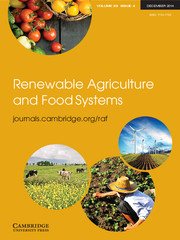Article contents
Intended and actual behavior of organic farmers in Austria after a five-year commitment period
Published online by Cambridge University Press: 12 February 2007
Abstract
Organic farmers throughout Austria were asked in 1999 if, once the first agri-environmental program (ÖPUL) ends, they intended to commit themselves to a further five-year period of organic farming. The study presented here addresses those farmers who expressed in the survey the intention to end their participation in organic farming under ÖPUL, or who were undecided at that time. The aim was to compare and analyze the intended behavior with actual behavior. The research was based on material from, and analyses of, the 1999 survey and the survey conducted in 2002. Additional information regarding the reasons for abandoning (or continuing) organic farming and the decision-making process itself was collected through a series of telephone interviews in 2004. The comparison revealed a connection between actual behavior and the intentions expressed in the 1999 survey. However, there were no clear differences in terms of the reasons given in 1999 for potentially discontinuing with organic farming between those farms that remained organic and those that reverted to conventional farming methods. There were differences between those reasons given in the 1999 survey for potentially leaving organic agriculture and the reasons that determined the actual decision, as cited in telephone interviews in 2004. In the 1999 survey, economic issues were the main reasons for potentially ceasing to farm organically. When it came to the actual decision, problems concerning organic guidelines and inspections were more prominent. The environmental attitudes and the social embedding of the farmers within organic agriculture played a decisive role on those enterprises that chose to continue farming organically. The analysis indicates that the presence of a successor is also a stabilizing factor for organic farming.
Keywords
- Type
- Review Article
- Information
- Copyright
- Copyright © Cambridge University Press 2006
References
- 12
- Cited by


